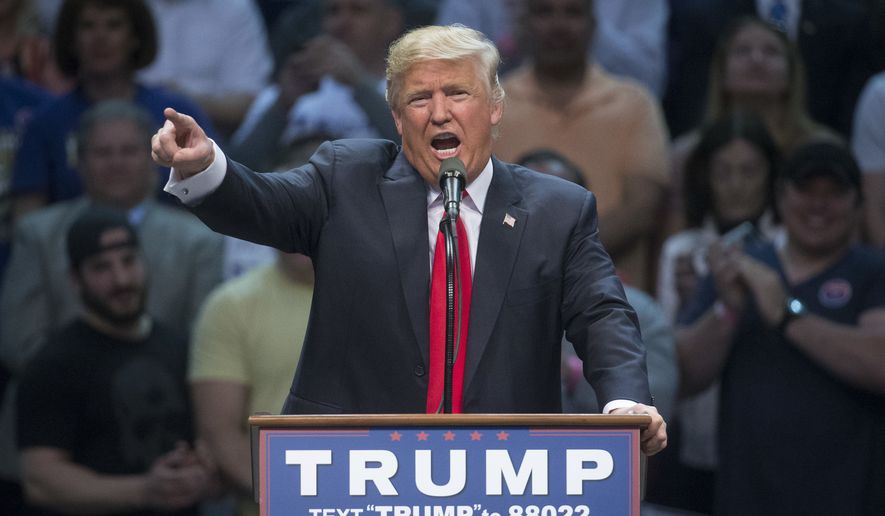Donald Trump could be leaving some winnable delegates on the table by not making a bigger push to lock down supporters in Pennsylvania, whose unique primary leaves most of the state’s delegates free to vote their conscience at the Republican National Convention in July.
Mr. Trump leads polling in Pennsylvania, but with most of the state’s convention delegates elected directly by Republican voters, the billionaire businessman’s backers say they wish he were doing more to reach out to the people running for those slots and support their efforts.
“The campaign has not been effective in engaging the delegates,” said Gabriel Keller, a candidate for delegate in the 12th Congressional District. “We have decided to move forward with or without the campaign. We are going to get Donald Trump the Pennsylvania delegates. It is not going to be the campaign, and our goal is to get 45 of the 54 [unbound delegates.]”
The major question in the Republican race, on the eve of the New York primary, was whether Mr. Trump could amass the 1,237 bound delegates needed to win the nomination on a first ballot, or whether Sen. Ted Cruz of Texas and Ohio Gov. John Kasich can deny him an outright majority, creating a contested convention where all sorts of scenarios could play out.
Mr. Trump has 744 delegates, Mr. Cruz is second with 559 delegates and Mr. Kasich has 144. Mr. Trump is likely to add to his lead Tuesday, with polling showing him poised to grab most of the 95 delegates at stake in New York.
Pennsylvania, Rhode Island, Maryland, Delaware and Connecticut vote next week, and analysts say if Mr. Trump keeps up his winning ways, he will be right on the cusp of the target, making each additional delegate he wins important.
In Pennsylvania, 71 delegates are on the line in the April 26 primary. Seventeen of those delegates will be bound, at least on the first ballot, to support whoever wins the popular vote in the state. But the rest of the delegates are directly elected by name, three from each of the state’s 18 congressional districts.
As a further complication, the ballot does not indicate whom a delegate plans to support, meaning voters hoping to back Mr. Trump, Mr. Cruz or Mr. Kasich will have to figure it out for themselves.
Mr. Keller said he is trying to get out the word that he will be a vote for Mr. Trump and set up a “Delegates for Trump” webpage that lists more than 40 others who are pledged to Mr. Trump.
The 38-year-old said he sought the campaign’s help but got nothing — not even a “Make America Great Again” hat.
“Every one of these newspaper articles, they talk about, ’Imagine these delegates. They are going to have the opportunity to fly on Air Trump or these vacations down at Mar-a-Lago Club.’ Screw that, I don’t even have a Trump hat,” he said with a chuckle. “I have probably spent more than $1,000 on my campaign. I am not spending $25 on a hat. The Trump campaign needs to get me a hat.”
Mr. Keller and other pro-Trump delegate candidates did say the campaign held a short conference call where officials said they were trying to figure out their level of support.
They requested that delegates sign a pledge vowing to endorse Mr. Trump throughout the convention.
“It is very odd how the organization is operating. It is more like an advisory assistance to grass roots,” said Cody Knotts, a Trump supporter who is running to be a delegate from the 9th Congressional District. “They are advising people how to set up websites, promote themselves, but they are not putting any money into it.”
Mr. Knotts, who has decades of political experience under his belt, described the approach as “spontaneous” and “haphazard” and said his impression is that the Cruz campaign is “more focused on the delegate fight.”
“I don’t know what to think. I am going to go into election day thinking, ’How strong is this network? How weak is this network? How well did they get the information out?’” Mr. Knotts said of the Trump organization. “He is going to win the state, but for the delegates, I have no clue whatsoever. This is 30 years of politics, and I have no idea what this means.”
Some activists are willing to cut the campaign some slack, saying the same thing that has fueled Mr. Trump’s unexpected rise — his outsider status — has also left him playing catch-up in the more traditional aspects of a campaign, including getting a handle on the delegate selection processes.
“I understand the frustration of the people, wishing they had more interaction with the campaign, but I also understand the reality that the campaign did not even become a reality until eight months ago,” said Ralph E. Wike III, who is running in the 7th Congressional District. “This is a true grass-roots campaign.”
• Seth McLaughlin can be reached at smclaughlin@washingtontimes.com.




Please read our comment policy before commenting.